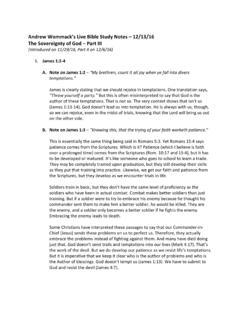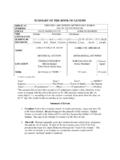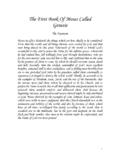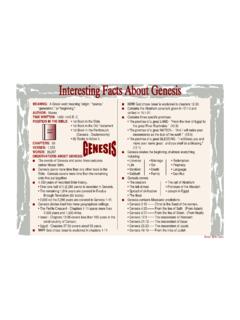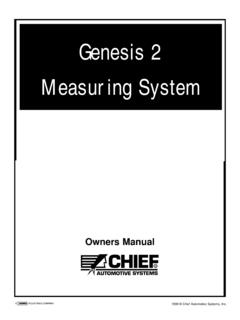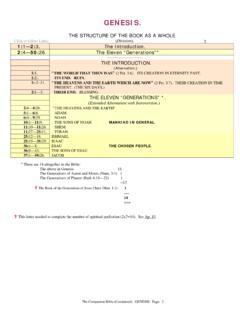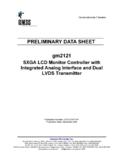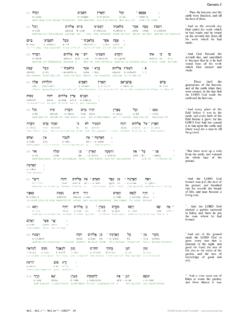Transcription of Andrew s Live Bible Study Notes 1/24/17 Genesis …
1 Andrew 's live Bible Study Notes 1/24/17 . Genesis 2:9-25. I. Genesis 2:9 And out of the ground made the LORD God to grow every tree that is pleasant to the sight, and good for food; the tree of life also in the midst of the garden, and the tree of knowledge of good and evil. Note on Genesis 2:9. The English word made used here was translated from a different Hebrew word than the one that was translated made in Genesis 2:3. This Hebrew word is samah, and it means, to sprout (transitive or intransitive, literal or figurative) (Strong's Talking Greek & Hebrew Dictionary). This implies the Lord planted this garden, just as stated in the previous verse (Gen.)
2 2:8), and the trees grew to maturity, denoting time. This would have to be after the original seven-day creation detailed in Genesis 1. This same Hebrew word was also translated grow in this very verse. If these trees were planted from seeds and grew to maturity before the Lord put Adam there, then the separation of Eve from Adam came after this or years after Adam's creation. See my note at Genesis 2:18. Notice that the Lord not only planted trees for food or necessity, but He also planted trees that were pleasant to the sight. This reveals that the Lord is not only interested in just supplying our basic needs, but He also is concerned about us enjoying ourselves and what He has created for us.
3 I know that God's layout of this garden puts to shame all of man's attempts to create gardens. This was beautiful and done for our pleasure and His (Rev. 4:11 and Ps. 35:27). The Tree of Life and the Tree of the Knowledge of Good and Evil were not just symbolic names. These trees actually produced what their names stated. When Adam and Eve ate of the Tree of the Knowledge of Good and Evil, their eyes were opened and they knew good and evil. Therefore, the Lord drove them out of the Garden of Eden so they would not eat of the Tree of Life and thereby life forever in their fallen state.
4 Once evil entered into the human race, it actually became a blessing that all people die. Death and the fear of death are tremendous deterrents to evil. And for those who have received the Lord's salvation, there is something better awaiting them in the next life. The Hebrew word tavek, which was translated midst in this verse, means a bisection, (by implication) the centre (Strong's Concordance). The significance of this is that this tree was not hidden in some corner, out of the way. It was right in the center of the Garden where the law of odds would say they had to have gone by this tree more than most.
5 Yet Adam and Eve had never paid attention to it before (Gen. 3:6). This says a lot about how God conscious they were before they partook of this tree. The Living Bible says this was the Tree of Conscience. The Tree of the Knowledge of Good and Evil is certainly descriptive of what a conscience does. This could be where man acquired the conscience. There wouldn't have been a need for one before man sinned. II. Genesis 2:10 And a river went out of Eden to water the garden; and from thence it was parted, and became into four heads. Note on Genesis 2:10. Rivers don't branch off as the water flows downstream just the opposite.
6 Branches of rivers consolidate and eventually end in one stream that empties into a sea or ocean. But this verse implies the opposite. III. Genesis 2:11 The name of the first is Pison: that is it which compasseth the whole land of Havilah, where there is gold. Note on Genesis 2:11. This is the only mention of the river Pison by that name in Scripture. Havilah was a son of Cush. Genesis 10:7 says, And the sons of Cush; Seba, and Havilah, and Sabtah, and Raamah, and Sabtecha: and the sons of Raamah; Sheba, and Dedan. The land of Havilah is mentioned twice in Scripture: And they dwelt from Havilah unto Shur, that is before Egypt, as thou goest toward Assyria: and he died in the presence of all his brethren (Gen.)
7 25:18) and And Saul smote the Amalekites from Havilah until thou comest to Shur, that is over against Egypt (1 Sam. 15:7). These references make the land of Havilah appear to be what is called the Sinai Peninsula today. IV. Genesis 2:12 And the gold of that land is good: there is bdellium and the onyx stone. Note on Genesis 2:12. The Bible called the gold of Havilah good. Man wouldn't have known gold from dirt if God hadn't said it was good. Of course, man has gone far beyond seeing gold as good, into covetousness, but nonetheless, God is the one who placed value on gold. V. Genesis 2:13 And the name of the second river is Gihon: the same is it that compasseth the whole land of Ethiopia.
8 Note on Genesis 2:13. The name Gihon means stream (Strong's Concordance). There was an area of Jerusalem named Gihon mentioned in the times of David and Solomon (1 Kin. 1:33, 38, and 45) and Hezekiah (2 Chr. 32:30 and 33:14). VI. Genesis 2:14 And the name of the third river is Hiddekel: that is it which goeth toward the east of Assyria. And the fourth river is Euphrates. Note on Genesis 2:14. The Hiddekel is the modern-day Tigris. The Euphrates is the same as the modern-day Euphrates. They both have their headwaters in modern-day Turkey. The Tigris and Euphrates merge in southern Iraq and flow into the Persian Gulf.
9 All of these rivers (Pison Gen. 2:11, Gihon Gen. 2:13, and Hiddekel [or Tigris] and the Euphrates . this verse) came from the same headwaters in the Garden of Eden. The Pison compassed the whole land of Havilah, which we today call the Sinai Peninsula. The Gihon compassed the whole land of Ethiopia. So, the topography of that area must have been very different back in the beginning. I suspect that during the Flood, when all the foundations of the earth were broken up (Gen. 7:11), is when the Mediterranean Sea and the Persian Gulf were formed, making things look totally different today.
10 VII. Genesis 2:15 And the LORD God took the man, and put him into the garden of Eden to dress it and to keep it. Note on Genesis 2:15. God gave sinless man something to do. God made us for work. It's part of what makes us happy. Prolonged idleness is not what God made us for. It appears to me that Adam existed for years before he was put into the Garden. If the Lord formed Adam and then planted a garden and let it grow naturally (see my note at Gen. 2:9), it would have taken years for the fruit trees to bear fruit to satisfy Adam's hunger. But what about Genesis 1:27, which speaks of God creating Adam and Eve on the sixth day?

